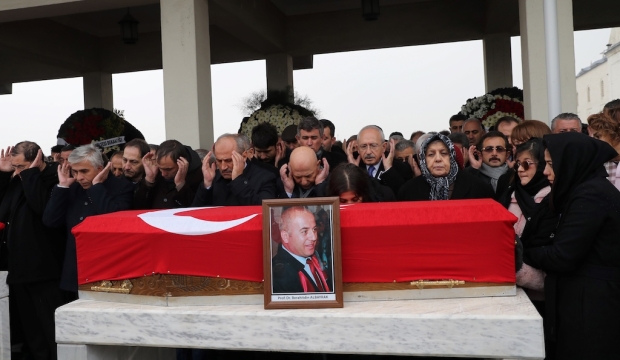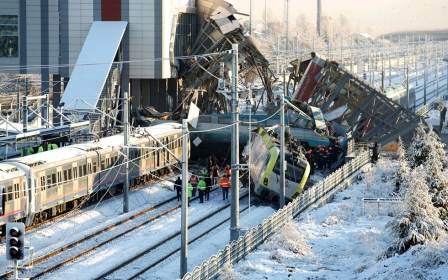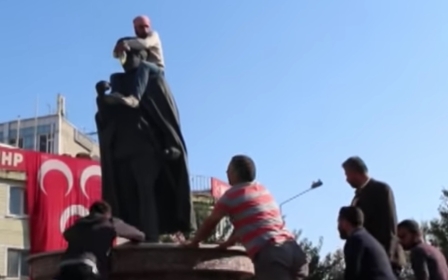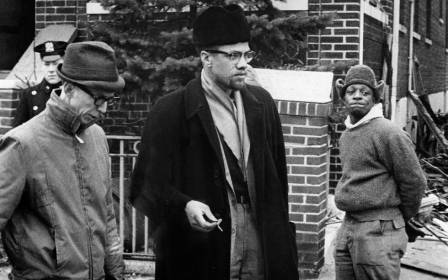Ankara crash: Train workers boycotted track opening over safety issues
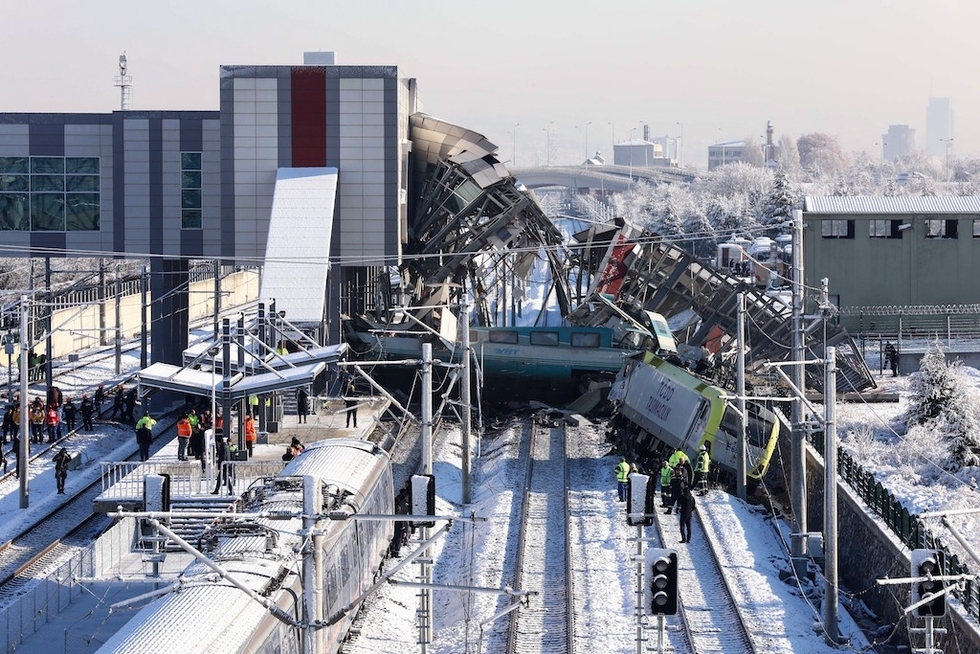
ISTANBUL - Turkish railway workers refused to participate in the opening ceremony for a stretch of track where a high-speed train crashed last week because they did not consider it to be safe, the head of the country's main transport union has told Middle East Eye.
Ahmet Eroglu, the secretary general of the United Transportation Workers (BTS), said that the union had raised concerns about the lack of signalisation along dozens of kilometres of the line from Ankara to Konya, which opened in April this year.
He said that communication between trains was instead taking place with two-way radios, paving the way for misunderstandings and errors.
Nine people were killed and more than 80 wounded on Thursday when the Konya-bound express train from the Turkish capital collided head-on with a locomotive which was being used by maintenance workers to inspect the track, coming off the rails and ploughing into an overpass.
The accident was the second deadly crash on Turkish railways in the last six months, and one of hundreds of incidents reported annually on average, according to evidence given by Cahit Turhan, the transportation minister, to a parliamentary inquiry in October.
Three railway employees were subsequently detained on suspicion of negligence.
But opposition parties, experts and union leaders say the latest accident, and others before it, are a consequence of a lack of qualified personnel, the inadequacy of investments and the restructuring of the railway administration for the sake of privatisation.
United Transportation Workers (BTS) secretary-general Ahmet Eroglu said the blame should not be put on the workers, but rather on the lack of infrastructure and a railway administration that has failed to take measures to prevent such accidents.
If there is a risk at the road and if one of the workers failed to notice it, then the other would spot it. But most of the workers have been laid off for the sake of the privatisation
- Ahmet Eroglu, United Transporation Workers
“We had refused to participate in the inauguration of this part of the railway because we said that the railway is not finished and that there is a lack of signalisation, that this was a safety risk. Unfortunately, we were right,” Eroglu told MEE.
He pointed out that the line, called “Baskent-ray” (Capital-rail), had opened in April, just two months before general and presidential elections on 24 June, despite the fact that a signalling system had not been installed.
"If there was signalisation, the red light would be on for the high-speed train because of the presence of the inspecting locomotive on the same line," he said.
A public prosecutor’s office investigating the incident seized the two-way radios for inspection.
Minister: Signals 'not a must-have'
Turhan on Friday did not respond to the questions of reporters on whether the signalling system was inadequate, but said signalisation is not a must-have system for railway transportation.
“Signalisation is a system that we are trying to construct in our railways. It is not a must-have for railway management. It is just additional security that helps the automatisation of the system. The ones who are claiming that the accident took place due to the lack of signalisation are not making right comments,” the minister said.
According to a 2017 annual report by the General Directorate of Turkish State Railways (TCDD), Turkey has 5,534km of signalled track, which is 44 per cent of the entire railway network. The total length of track is 12,470km.
We have moved heaven and earth for the past five months to prevent one more person from getting hurt! Shut down the institutions you cannot succeed in managing! Resign! Do not get on those trains
- Misra Oz, campaigner
In the same speech, Turhan added that one of the aims of signalisation was to reduce the number of personnel involved in running the system.
But for the BTS, trying to reduce the number of personnel is a problem on its own.
“If there is a risk on the tracks and if one of the workers failed to notice it, then the other would spot it. But most of the workers have been laid off for the sake of the privatisation,” said Erodglu.
When responding to the parliamentary inquiry in October, Turhan said that in 2002 the Turkish railway had 36,626 workers, while the number was 13,769 this year.
He also noted that between the years 2003 and 2017, a total of 4,141 accidents took place on the tracks, with 1,418 people killed and 2,627 injured. According to him, the average accident number for the same time period was 276 every year.
Track collapsed after heavy rains
An expert report submitted to a court overlooking another train accident, which killed 24 people this summer in the northwestern town of Corlu, stressed that inspections of the infrastructure of the railway had not been carried out.
The crash occurred following heavy rains when the train derailed after the tracks, perched on sloppy and muddy earth, collapsed.
At the time, the railway workers’ union said that the number of railway watchmen, who are tasked with checking the physical condition of the track, had been reduced.
The main opposition Republican People's Party (CHP) described the incident in summer as “murder” and called for the resignation of railway administration officials.
Misra Oz, who has been actively campaigning on social media after losing her nine-year-old son in the Corlu crash, took to Twitter once again - but this time angered by Thursday’s crash in Ankara.
“Do not express your condolences for those citizens killed! We have moved heaven and earth for the past five months to prevent one more person from getting hurt! Shut down the institutions you cannot succeed in managing! Resign! Do not get on those trains,” she tweeted.
Her tweets criticising the railway administration in November had led the head of the TCDD, Isa Apaydin, to block her on Twitter.
Apaydin this time, after the incident in Ankara, switched his Twitter account to private first then later made it public again after changing his profile picture to a photo of a Turkish flag.
Privatisation problems
CHP MP Omer Fethi Gurer on 9 December, a few days before the crash, told a parliamentary committee that the problems of railway transportation in Turkey were growing every day.
“The TCDD’s structure has been altered for privatisation and its administration is far from competency, which is why the rate of incidents like this is increasing,” he wrote to MEE in an email.
He added that the railways' administration organisational structure was divided into two, infrastructure and transportation, and the division was causing problems.
“Efforts to privatise railways in Europe were made, but have not yielded any successful results. However, such efforts in Turkey are still going on,” he added.
The CHP has called for a parliamentary inquiry to investigate the crash.
New MEE newsletter: Jerusalem Dispatch
Sign up to get the latest insights and analysis on Israel-Palestine, alongside Turkey Unpacked and other MEE newsletters
Middle East Eye delivers independent and unrivalled coverage and analysis of the Middle East, North Africa and beyond. To learn more about republishing this content and the associated fees, please fill out this form. More about MEE can be found here.


